TL;DR: Virgin recycling, also known as primary or pre-consumer recycling, refers to the process of recycling leftover raw materials from manufacturing processes to prevent them from becoming waste. This process involves reusing the residual raw materials to produce new products.
It’s important because it saves resources, reduces waste, and is more energy-efficient than using virgin materials. Remember, each small step towards virgin recycling makes a significant impact on our environment.
Unveiling the Concept of Virgin Recycling
In this journey to demystify the virgin recycling concept, the first thing we need to address is its fundamental definition. Virgin recycling, sometimes referred to as primary or pre-consumer recycling, is an innovative strategy that involves the reutilization of surplus raw materials from manufacturing processes, effectively transforming what would have been waste into valuable resources.
This unique process happens before the product even reaches the consumer, hence the “pre-consumer” term. Materials such as scraps, trimmings, or other manufacturing byproducts that typically would be discarded are repurposed to create new items.
Consequently, this process significantly reduces the amount of virgin materials – that is, raw materials that have never been used before – required in manufacturing new products.
Why Is Virgin Recycling Crucial?
Virgin recycling bears significance for various reasons:
- Resource Conservation: Virgin recycling makes optimal use of existing resources by reprocessing manufacturing waste back into usable materials, thus decreasing the need for new raw resources.
- Waste Reduction: By recycling what would have otherwise been waste, this process considerably cuts down the amount of industrial waste, significantly reducing pollution and contributing to a healthier environment.
- Energy Efficiency: Producing products from recycled materials typically requires less energy than creating items from virgin materials. This energy efficiency makes virgin recycling an environmentally friendlier process.
Diving Deeper: The Virgin Recycling Process
The process of virgin recycling involves several critical steps:
- Generation of waste: The process begins when manufacturers generate waste during production. These can be unused raw materials, defective products, or excess materials.
- Collection: These waste materials are then gathered and transported back to recycling facilities.
- Sorting and cleaning: Here, the waste materials are sorted based on their type and cleaned to prepare them for the recycling process.
- Processing: The clean materials are processed into a form that can be used in manufacturing. This can involve melting, shredding, or otherwise altering the materials.
- Manufacture of new products: The recycled materials are then used to manufacture new products, completing the recycling cycle.
Virgin Recycling vs Post-Consumer Recycling
Understanding the difference between virgin and post-consumer recycling is crucial. While both processes aim to minimize waste and conserve resources, they differ in the sources of their recycled materials.
As we’ve established, virgin recycling deals with pre-consumer, manufacturing waste. On the other hand, post-consumer recycling involves materials discarded by consumers after use, like glass bottles, paper, or plastic containers.
While both are beneficial, virgin recycling has some distinct advantages:
- Contaminant-Free Materials: Virgin recyclable materials are often cleaner and free from contaminants since they haven’t been used, increasing the efficiency of the recycling process.
- Consistent Quality: Since these materials come directly from manufacturers, they often have a uniform quality, making the recycled product also of higher quality.
The Economic Perspective of Virgin Recycling
The financial implications of virgin recycling can be quite profound and can influence manufacturers to opt for this eco-friendly approach.
By recycling and reusing raw materials, industries can significantly cut down on the cost of acquiring new, virgin materials. This reduction can lead to a decrease in production costs and a subsequent increase in profit margins.
Moreover, many consumers are growing more conscious about their impact on the environment and are increasingly supportive of businesses that demonstrate a commitment to sustainability.
Thus, adopting practices such as virgin recycling can not only reduce costs but also potentially attract a larger, more environmentally-minded customer base.
The Role of Technology in Virgin Recycling
The realm of virgin recycling has greatly benefited from technological advancements. Sophisticated processes and machinery have been developed to more efficiently and effectively sort, clean, and process industrial waste materials.
This includes everything from advanced sorting mechanisms that can segregate waste based on material type, to highly efficient processing machines that can recycle materials with minimal energy consumption.
Moving forward, further advancements in technology promise to enhance the process of virgin recycling. These could include the development of artificial intelligence systems to automate the sorting process, the invention of new recycling processes that can handle a wider range of materials, or improvements in energy efficiency to further minimize the environmental impact.
Legislation and Virgin Recycling
Government legislation can also play a significant role in the prevalence and efficacy of virgin recycling. Policies that provide incentives for businesses to recycle their waste, or regulations that penalize unnecessary waste, can motivate more companies to adopt virgin recycling practices.
Some countries have already implemented such policies. For example, the European Union’s Waste Framework Directive requires member states to take necessary measures to promote waste prevention, reuse, and recycling. Other countries have implemented tax benefits for companies that engage in recycling activities.
I recommend businesses to stay informed about such legislation and take advantage of any incentives they offer. By doing so, they can simultaneously contribute to environmental preservation and boost their own financial performance.
Virgin Recycling: Challenges and Future Prospects
While virgin recycling holds immense promise, it is not without its challenges. These include the need for more efficient recycling technologies, logistical difficulties in waste collection and segregation, and the need for more supportive legislation.
Despite these challenges, the future of virgin recycling appears bright. Increasing awareness about environmental issues, advancements in technology, and supportive government policies are all expected to contribute to the growth of this practice.
As we look ahead, I recommend manufacturers and consumers alike to continue championing for virgin recycling. Whether that means lobbying for more supportive government policies, investing in recycling technology, or simply choosing to support businesses that engage in sustainable practices, every effort can make a significant difference. After all, it is only through collective action that we can hope to achieve a more sustainable and healthier planet.
Virgin Recycling: The Path Forward
Virgin recycling has the potential to revolutionize the way we manage waste and use resources. Not only does it provide an efficient method to reduce waste, but it also promotes sustainable practices, paving the way for a greener future.
I recommend manufacturers to consider incorporating virgin recycling into their processes if they haven’t done so already. By doing so, they can significantly contribute to environmental conservation while simultaneously reducing their operating costs.
Conclusion
To wrap things up, virgin recycling represents a transformative approach to waste management and resource conservation. By focusing on repurposing unused manufacturing materials, this process significantly reduces the demand for virgin resources, promotes energy efficiency, and contributes to a healthier planet.
While it is primarily a manufacturing-level practice, understanding and advocating for it as consumers can significantly impact our environment’s health.
FAQs
How does virgin recycling impact the environment?
Virgin recycling positively impacts the environment by reducing waste, conserving resources, and minimizing the energy required for production.
How does virgin recycling differ from regular recycling?
While both processes aim to minimize waste, virgin recycling involves pre-consumer materials from manufacturing processes, while regular (post-consumer) recycling deals with items discarded by consumers.
Note: While virgin recycling plays a significant role in resource conservation, it doesn’t eliminate the need for responsible consumption and disposal habits. Both consumers and manufacturers have a crucial role to play in sustainable practices.

